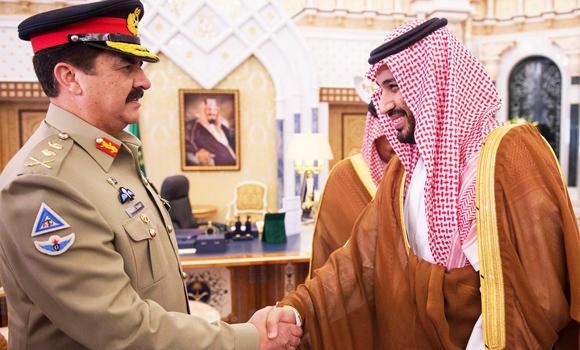The offer came from Prime Minister Nawaz Sharif during his meeting with Saudi Deputy Crown Prince and Defence Minister Prince Mohammad bin Salman, who visited Islamabad as part of the kingdom’s efforts to seek Pakistan’s backing for the recently formed Saudi-led coalition.
Mohammad bin Salman, who was the second high-level official from Saudi Arabia to visit Pakistan in three days, also held talks with army chief General Raheel Sharif at the GHQ in Rawalpindi. Earlier in the week, Saudi Foreign Minister Adel bin Ahmed al Jubeir visited Islamabad.
The focus of the Saudi defence minister’s discussions both at the PM Office and GHQ was on securing Pakistan’s support for the Saudi move to cobble together a coalition of 34-nation Islamic countries as well as current tensions between Saudi Arabia and Iran.
An official statement said the premier recalled how Pakistan had historically pursued the policy of promoting brotherhood among member states of OIC (Organisation of Islamic Countries).
“Pakistan has also always expressed its readiness to offer its good offices to brotherly Muslim countries for resolution of their differences through peaceful dialogue and reconciliation,” Nawaz added.
A senior official privy to the meeting between the Saudi prince and the prime minister said Islamabad voiced its deep concerns over the Saudi-Iran row and warned that the situation could have serious implications for Pakistan.
“That is why the prime minister has offered Pakistan’s good offices to defuse tensions,” added the official, who asked to remain anonymous because he was not authorised to speak to the media. However, it is not clear if Riyadh and Tehran are willing to accept Pakistan as a mediator.
Tensions between the Saudi Arabia and Iran have been on the rise ever since the former executed a prominent Shia cleric in early January. Angry protesters had then stormed the Saudi Embassy in Tehran before setting it on fire. The incident caused a cascading effect with Gulf countries cutting off diplomatic ties with Tehran.
The war of words coupled with retaliatory actions against each other by Saudi Arabia and Iran had left Pakistan in a fix on making a decisive call about the Saudi coalition.
Despite the fact that its role remains vague, Pakistan on Sunday extended its backing to the coalition.
“The prime minister welcomed the Saudi initiative to establish a coalition of likeminded Islamic countries to counter terrorism and militancy and informed the deputy crown prince that Pakistan supports efforts to counter terrorism and extremism,” said the official statement.
The term ‘likeminded Islamic countries’ appears to address crucial questions regarding the exclusion of certain countries such as Iran, Iraq and Syria from the coalition.
But with details about the coalition scarce, there is little clarity on the extent of involvement which Saudi Arabia is seeking from Pakistan. Officials in Islamabad have privately made it clear that Pakistan will not spare troops for the coalition and at the same time will not become part of any action that is against any specific country. However, a second visit by a senior Saudi official within a span of three days suggests that Riyadh may have secured some sort of commitment from Islamabad.
On Sunday, Premier Nawaz once again stated that Pakistan would always stand with the people of Saudi Arabia against any threat to the sovereignty and territorial integrity of the kingdom.
The two leaders agreed to further strengthen bilateral relations between Pakistan and Saudi Arabia and deepen bilateral cooperation in all fields, including defence security, fight against terrorism, trade and investment and manpower requirements of the Kingdom.
The Saudi prince appreciated the valiant efforts waged by the security and law enforcement authorities to root out terrorism from Pakistan, particularly through the military campaign Zarb-e-Azb.






